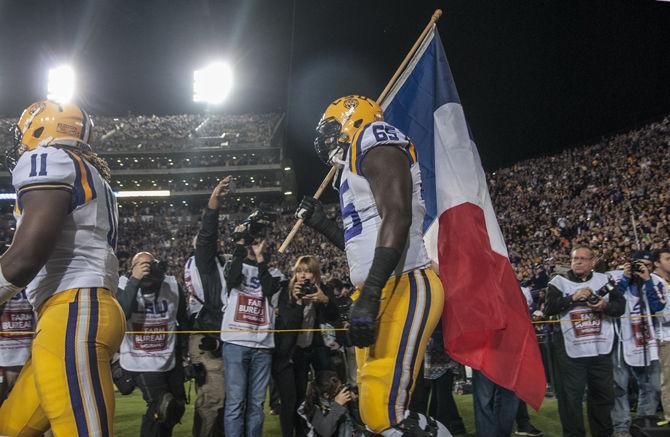Blue, white and red flooded Facebook last week as users changed their profile pictures in support of Paris.
After tragedy shook Paris, Facebook allowed users to overlay the colors of the French flag on their profile pictures. Before the blood dried on the floor of the Bataclan, the #jesuisparis and #prayforparis hashtags took the place of pictures of the previous night’s “Thirsty Thursday” shenanigans.
The French flag was a nice gesture, but how does it actually support a country rocked by terror?
Changing your profile picture doesn’t hold significance for those who lost family or friends in the Paris attacks — it simply shows you can click a button. It doesn’t show you care, it shows you feel bad about what happened but don’t really care to do anything more.
Sure, the filter spreads awareness to the people who’ve been living under a rock and haven’t heard about the tragedy, but nothing else happens.
Do the tragedy hipsters of our generation really believe they are making a difference in the world by changing their Facebook picture or by tweeting #prayforparis? Or do they only want to engage in the public mourning? Facebook is primarily a performance space.
This passivity is coined “slacktivism,” online activism requiring little to no time or involvement. A study from the University of British Columbia Sauder School of Business found showing support online causes people to associate with causes but actually makes them less likely to commit any tangible resources to them.
Beirut suffered a tragedy just one day before Paris, but there was no outpouring of emotion over the Internet and no pray for Beirut hashtags from the Facebook freedom fighters. The social media reaction to tragedy is self-indulgent and useless. Millions of people are changing their profile pictures just to show, “Hey, I care,” using social media to express some sort of compassion and a vicarious participation in the event.
Before the attack on Beirut, twin bombs ripped through a Somalian hotel, killing at least 15 people. Terrorist deaths in Baghdad, Kenya and Nigeria don’t even raise an eyebrow, yet the attack on Paris has social media firing on all cylinders.
Do you care about all tragedies in the world equally? Probably not. It goes without saying that
terror in Middle Eastern countries doesn’t have quite the same affect as terror in Western civilizations. It is easy to blame the media for failing to cover other attacks the way they covered Paris, but this ignoring the larger social forces that causes the media to pay more attention to some attacks over others, the public. The media is fueled by what consumers want, and the sad truth is people are more likely to be concerned about victims they can identify with.
After 9/11, The Onion ran an article titled, “Not knowing what else to do, woman bakes cake of American flag.” Facebook wasn’t around then, but the effect is the same. Not knowing what else to do, we change our profile pictures to be cloaked in blue, white and red.
These social media movements like #kony2012 or rainbow-filtered profile pictures tend to fade to black, replaced by a picture of someone’s lunch or a funny cat video.
This is not to say a mass outpouring of empathy and compassion toward Paris is not a notable gesture. However, we can do more, such as donating to the Red Cross or the families of the victims. However well-intentioned the Facebook filter was, millions clicked on this feature mindlessly and without a second thought, offering no real support to the people of Paris.
If you really want to help the people of Paris, put some effort into it. Give money, volunteer, sign a petition calling for substantive change in how we deal with terrorism. As a society, we need to stop using social media as way to show we care.
We can use social media to promote change and express support, but we cannot stop there. Paris deserves more than the colors of their flag awash on millions of Facebook pictures.
Mariah Manuel is a 22-year-old mass communication senior from Lake Charles, Louisiana. You can reach her on Twitter @mariah_manuel.
Opinion: ‘Slacktivism’ is a poor excuse for compassion
November 23, 2015
LSU junior offensive tackle Jerald Hawkins (65) walks out of the locker room with a French flag before the Tigers’ 31-14 defeat against The University of Arkansas in support of the terrorist attacks in Paris on Saturday, Nov. 14, 2015 in Tiger Stadium.
More to Discover








